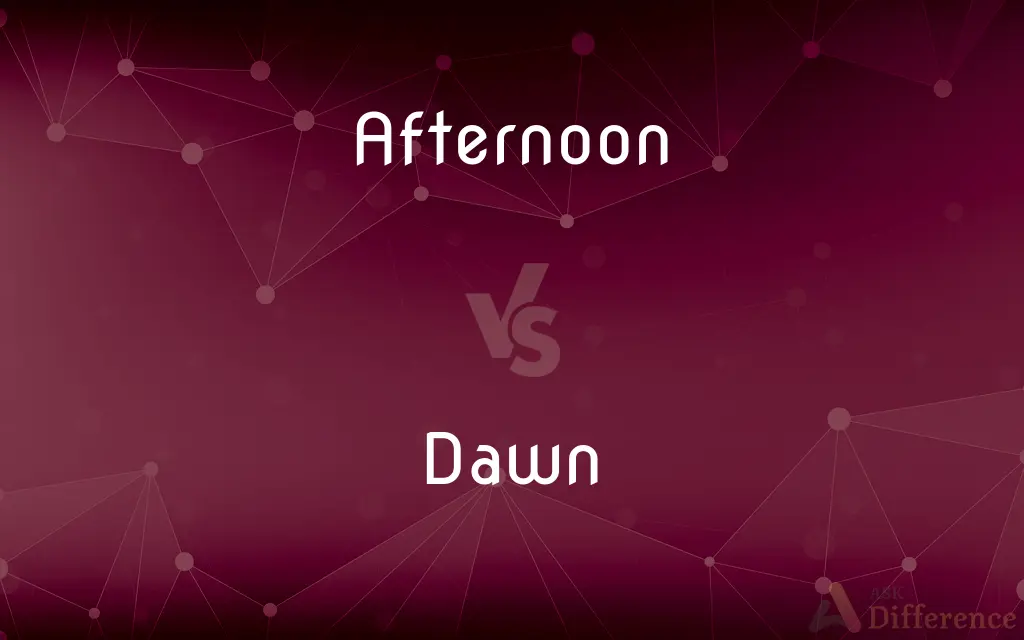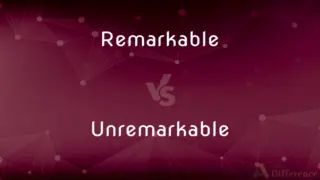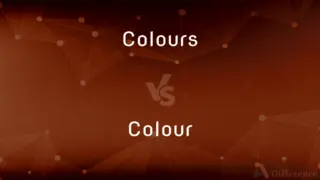Afternoon vs. Dawn — What's the Difference?
By Tayyaba Rehman — Updated on September 18, 2023
Afternoon is the part of the day between noon and evening, while Dawn is the first light of day before sunrise.

Difference Between Afternoon and Dawn
Table of Contents
ADVERTISEMENT
Key Differences
Afternoon refers to the period of the day following noon and preceding evening, usually stretching from 12:01 PM to around 5 PM or 6 PM. In contrast, Dawn represents the early morning hours, marking the transition from nighttime to daytime, just before the sun rises.
People typically engage in various activities during the Afternoon, such as working, attending school, or relaxing. Meanwhile, Dawn is often a quieter time when many are still asleep or just waking up, with the world slowly illuminating.
In literature and poetry, Afternoon might symbolize the middle or declining phase of something, perhaps referencing the later stages of life or a waning event. On the other hand, Dawn is emblematic of beginnings, hope, and rebirth, signaling a fresh start.
From a cultural standpoint, activities during the Afternoon vary globally, including traditions like the Spanish "siesta." Dawn, in many cultures, holds spiritual significance, with early morning prayers or rituals emphasizing its purity and promise.
In terms of appearance, the Afternoon sun is high and can be scorching, especially in summer. Dawn brings with it a soft, often golden or rosy light, casting long shadows and painting the sky with hues of orange and pink.
ADVERTISEMENT
Comparison Chart
Time of Day
Period post-noon until evening
Early morning, just before sunrise
Symbolism
Middle phase or decline
Beginnings, hope, rebirth
Common Activities
Working, school, relaxation
Waking up, spiritual rituals, contemplation
Cultural Significance
Varies; includes traditions like siestas
Early morning prayers, spiritual significance
Appearance
High sun, bright or scorching
Soft light, orange/pink hues, long shadows
Compare with Definitions
Afternoon
A decline or waning phase.
The company is in the Afternoon of its dominance.
Dawn
A realization or awareness.
Understanding suddenly Dawned on him.
Afternoon
The time when the sun is descending from its peak.
The shadows lengthen in the Afternoon.
Dawn
The first light of day before sunrise.
She woke up at Dawn to see the sunrise.
Afternoon
The latter part of the day, especially from mid-to-late afternoon.
The event will occur in the late Afternoon.
Dawn
The earliest period of something.
The Dawn of civilization saw numerous innovations.
Afternoon
Afternoon is the time of the day between noon and evening. It is the time when the sun is descending from its peak in the sky to somewhat before its terminus at the horizon in the west.
Dawn
A time marked by renewed hope or freshness.
After the storm, a new Dawn emerged.
Afternoon
The part of the day from noon until evening.
She has a meeting scheduled for the Afternoon.
Dawn
Dawn is the time that marks the beginning of twilight before sunrise. It is recognized by the appearance of indirect sunlight being scattered in Earth's atmosphere, when the centre of the Sun's disc has reached 18° below the observer's horizon.
Afternoon
Informal reference to a slightly post-noon timeframe.
Let's grab coffee this Afternoon.
Dawn
The time each morning at which daylight first begins.
Afternoon
The time from noon or lunchtime to evening
I'll be back at three in the afternoon
I telephoned this afternoon
She worked on Tuesday afternoons
Dawn
A first appearance; a beginning
The dawn of history.
Afternoon
In the afternoon; every afternoon.
Dawn
To begin to become light in the morning.
Afternoon
Short for good afternoon
Dawn
To begin to appear or develop; emerge.
Afternoon
The part of day from noon until dinnertime or sunset.
Dawn
To begin to be perceived or understood
Realization of the danger soon dawned on us.
Afternoon
The latter part
In the afternoon of life.
Dawn
(intransitive) To begin to brighten with daylight.
A new day dawns.
Afternoon
The part of the day from noon or lunchtime until sunset, evening, or suppertime or 6pm.
Dawn
(intransitive) To start to appear or be realized.
I don’t want to be there when the truth dawns on him.
Afternoon
(figuratively) The later part of anything, often with implications of decline.
Dawn
(intransitive) To begin to give promise; to begin to appear or to expand.
Afternoon
(informal) A party or social event held in the afternoon.
Dawn
(uncountable) The morning twilight period immediately before sunrise.
Afternoon
In the afternoon.
Dawn
(countable) The rising of the sun.
Afternoon
Ellipsis of good afternoon
Dawn
(uncountable) The time when the sun rises.
She rose before dawn to meet the train.
Afternoon
The part of the day which follows noon, between noon and evening.
Dawn
(uncountable) The earliest phase of something.
The dawn of civilization
Afternoon
The part of the day between noon and evening;
He spent a quiet afternoon in the park
Dawn
To begin to grow light in the morning; to grow light; to break, or begin to appear; as, the day dawns; the morning dawns.
In the end of the Sabbath, as it began to dawn toward the first day of the week, came Mary Magdalene . . . to see the sepulcher.
Afternoon
A conventional expression of greeting or farewell
Dawn
To began to give promise; to begin to appear or to expand.
When life awakes, and dawns at every line.
Dawn on our darkness and lend us thine aid.
Dawn
The break of day; the first appearance of light in the morning; show of approaching sunrise.
And oft at dawn, deep noon, or falling eve.
No sun, no moon, no morn, no noon,No dawn, no dusk, no proper time of day.
Dawn
First opening or expansion; first appearance; beginning; rise.
These tender circumstances diffuse a dawn of serenity over the soul.
Dawn
The first light of day;
We got up before dawn
They talked until morning
Dawn
The earliest period;
The dawn of civilization
The morning of the world
Dawn
An opening time period;
It was the dawn of the Roman Empire
Dawn
Become clear or enter one's consciousness or emotions;
It dawned on him that she had betrayed him
She was penetrated with sorrow
Dawn
Appear or develop;
The age of computers had dawned
Dawn
Become light;
It started to dawn, and we had to get up
Dawn
The beginning or rise of anything.
The Dawn of a new era was upon them.
Common Curiosities
When does Dawn occur?
Dawn occurs in the early morning, just before sunrise.
What time does Afternoon usually start?
Afternoon starts right after noon, at 12:01 PM.
What's the significance of Dawn in literature?
In literature, Dawn often symbolizes hope, new beginnings, and rebirth.
Can Afternoon be used metaphorically?
Yes, Afternoon can metaphorically reference a middle or declining phase of something.
Can Dawn also mean understanding?
Yes, to say something "dawns" on someone means they've come to a realization.
What is "afternoon tea"?
Afternoon tea is a British tradition of having tea with snacks in the Afternoon.
Can Afternoon be abbreviated?
Yes, it's often abbreviated as "p.m." when denoting time.
Is Dawn the same as sunrise?
No, Dawn is the period before sunrise when light starts appearing.
Is late Afternoon considered evening?
No, late Afternoon precedes the evening. Evening starts after the Afternoon ends.
Is mid-Afternoon the same as noon?
No, mid-Afternoon refers to the middle part of the Afternoon, not noon.
Which is typically cooler, Dawn or Afternoon?
Dawn is usually cooler than Afternoon.
How long does Dawn last?
Dawn lasts for a short period, from the first light until the sun rises.
Is "post-Afternoon" a common term?
No, the term after Afternoon is usually "evening."
Why is Dawn often associated with spirituality?
Dawn, being a fresh start of the day, often holds spiritual significance, symbolizing purity and new beginnings.
Which comes first, Dawn or morning?
Dawn comes before morning.
Share Your Discovery

Previous Comparison
Remarkable vs. Unremarkable
Next Comparison
Colours vs. ColourAuthor Spotlight
Written by
Tayyaba RehmanTayyaba Rehman is a distinguished writer, currently serving as a primary contributor to askdifference.com. As a researcher in semantics and etymology, Tayyaba's passion for the complexity of languages and their distinctions has found a perfect home on the platform. Tayyaba delves into the intricacies of language, distinguishing between commonly confused words and phrases, thereby providing clarity for readers worldwide.
















































